
The Ghanaian Languages Wikimedia Community Meetup 2024, sponsored by the Wikimedia Foundation, was the second edition of a mini conference that was held from 26-28th July 2024, designed to bring 11 Wikimedian communities together who are working on the indigenous language Wikipedia’s in Ghana. The communities include Dagbani Wikimedians User Group, Fante Wikimedians Community, Dagaare Wikimedia Community, Kusaal Wikimedia Community, Moore Wikimedia Community, Gurene Wikimedia Community, Ghanaian Pidgin Wikimedia Community, Ewe Wikimedia Community, Twi Wikimedia Community, Nzema Wikimedia Community and Ga Wikimedia Community.
The goal of the conference was to bring most Ghanaians who contribute to the local languages together to give them a sense of belonging and boost their confidence in digitizing their languages to prevent them from going extinct, while also closing up the digital divide that keeps people disconnected from the internet because of language barriers since these communities face similar challenges.
The theme for this year was “Strengthen Ghanaian Languages on the Internet. All language communities presented their successes, challenges, and ways forward.
Gurene Wikimedia Community In Perspective
The Gurene Wikimedia Community began in September 2021 and has witnessed sustained growth over the years. The community has seen notable developments recently, including a 10% increase in WhatsApp membership, which has become a crucial platform for communication and coordination. This growth reflects heightened interest and engagement, indicating that members are increasingly leveraging digital tools to stay connected and involved.
A significant achievement was the 100% increase in female leadership within the community. This milestone underscores the community’s commitment to gender diversity and empowering women in leadership roles. Enhanced female participation has contributed to a more inclusive and representative environment, promoting a broader range of perspectives and ideas.
Despite these positive changes, there has been a decline in editing activity among active editors. This trend highlights the need for strategies to re-engage current members and recruit new contributors to sustain and expand the community’s content creation efforts.
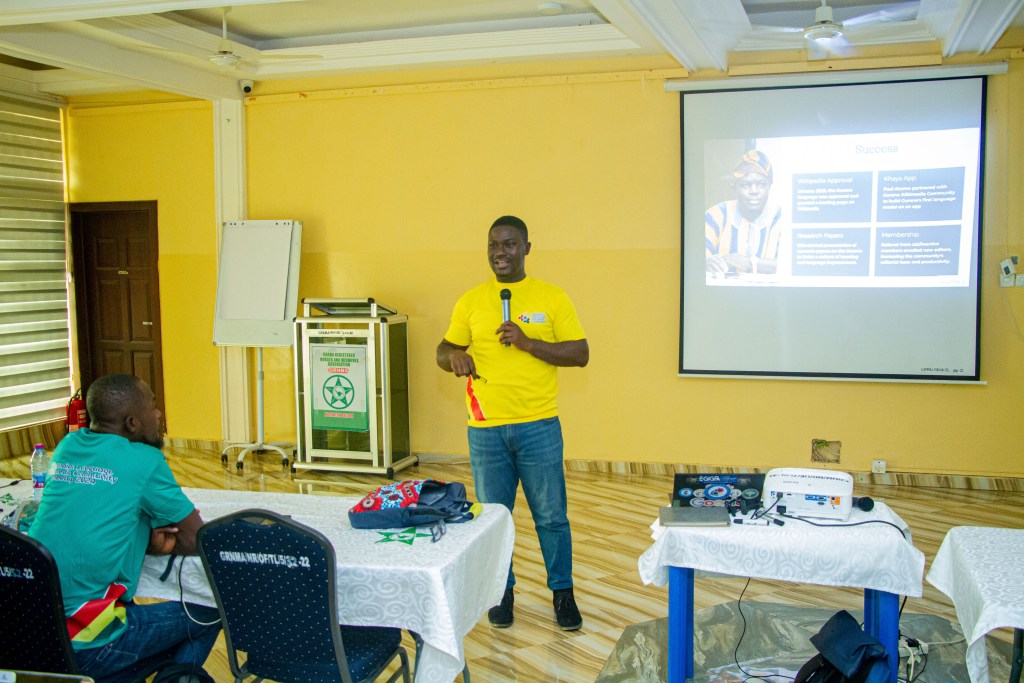
Projects in Review
One notable project focused on documenting and promoting the intangible cultural heritage of the Gurene people. This initiative aimed to preserve and globalize unique cultural practices, traditions, and expressions, ensuring their recognition and safeguarding for future generations.
Another key project centered on the Parliament of Ghana, involving the creation and enhancement of articles related to its history, members, and legislative activities. The focus was on documenting the impact of parliamentary activities on the Gurene community, providing a comprehensive view of Ghana’s political landscape.
An initiative to address climate change awareness was also undertaken, with localized content created in the Gurene language. This project aimed to educate and mobilize local populations regarding climate action and advocacy, highlighting the specific impacts on the Gurene community.
The community also worked on preserving the Gurene linguistic heritage by creating detailed entries about Gurene names, their meanings, and the associated communities. This effort sought to document and provide accurate information about Gurene culture and social structures.
Successes
In January 2023, the Gurene Wikipedia was officially approved, marking a major milestone for the community. This approval enabled the creation and editing of articles in the Gurene language, facilitating the preservation and promotion of the language and its associated culture.
The integration of the Gurene language model into the Khaya app represented another success. This app supports language learning and usage, providing valuable resources and tools for Gurene speakers and learners, thus aiding in the promotion and preservation of the language.
The community’s efforts to present research papers on the Gurene language have fostered academic interest and scholarly exploration. This initiative has encouraged researchers to delve into various aspects of Gurene linguistics and culture, contributing to the academic body of knowledge.
Future Plans
To address the decline in editing activity and foster renewed engagement, the community plans to implement strategies such as organizing workshops, meetups, and outreach programs. These activities are designed to reignite enthusiasm and participation among existing members and attract new contributors.
Extending office hours is another planned initiative, aimed at providing additional support and resources. This includes dedicated time for training, consultations, and collaborative projects, which will enhance overall productivity and member engagement.
Improving digital marketing efforts is also on the agenda. By leveraging social media platforms, creating engaging content, and utilizing digital tools, the community aims to increase its visibility and connect with a broader audience, thus attracting more contributors and supporters.
Ewe Wikimedia Community In Perspective
In February 2023, the Ewe Wikimedia Community embarked on a mission to document and promote the Ewe language across Wikipedia and its sister projects. With just two dedicated executives leading the charge, the community began with a modest group of five members, driven by a strong commitment to preserving and celebrating their cultural heritage through digital platforms.
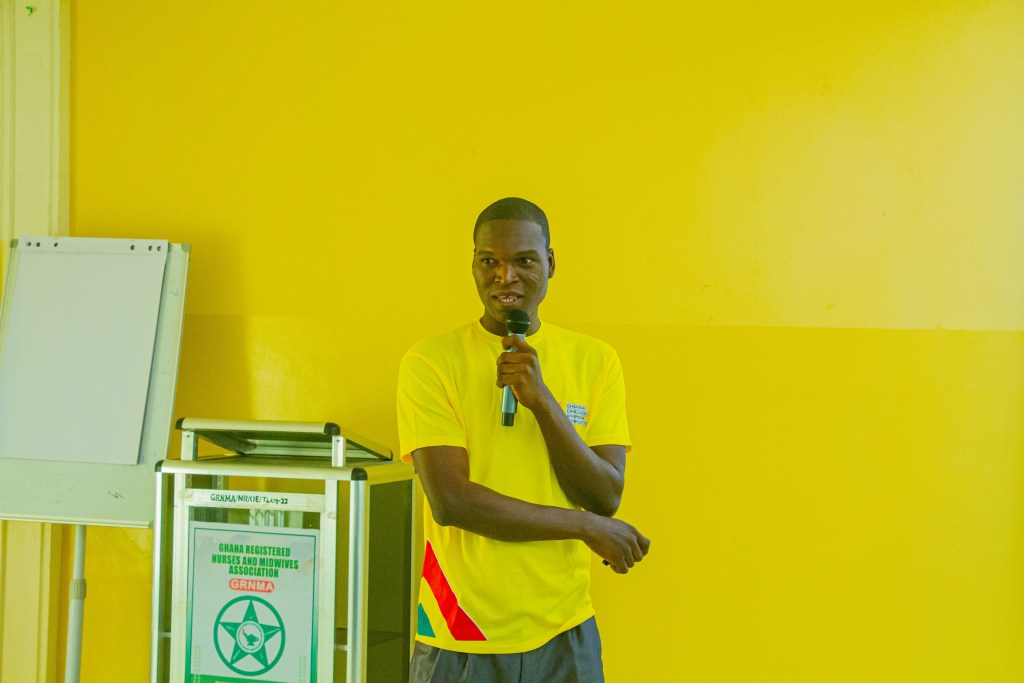
MR. CHRISTOPHER AZORBLI SPEAKING FOR EWECollaborative Projects and Community Engagement
A notable early initiative was the collaboration with the Wikimedians of Twi Language on the AfroCuration project. This project aimed to create and enhance articles about African artists, emphasizing the importance of documenting cultural content in local languages. This partnership highlighted the value of cross-community collaboration in enriching Wikipedia with diverse cultural perspectives.
To build skills and engage newcomers, the community organized several workshops and meet-ups, both online and in-person. These sessions introduced participants to the basics of Wikipedia content creation and translation, empowering them to contribute actively to the Ewe Wikipedia and fostering a sense of ownership over the content.
Another key engagement effort was participating in the Wiki Loves Africa contest through a Photowalk event. This hands-on experience allowed members to learn about Wikimedia Commons, upload content, and understand contest rules, which not only increased contributions but also deepened their familiarity with the platform.
A significant partnership with the Loves Aid Foundation marked a milestone for the community. The foundation’s team and volunteers were introduced to Wikipedia and its sister projects, with the foundation providing space for physical meet-ups. This collaboration fostered regular community interactions and facilitated a productive and supportive environment.
Additionally, the community formed a partnership with the Ewe Language Department at the University of Education, Winneba (Ajumako Campus). After multiple meetings, the university agreed to collaborate, bringing linguistic expertise to the project. This partnership aimed to produce high-quality content for the Ewe Wikipedia, leveraging the department’s academic resources.
Successes
The AfroCuration project saw successful collaboration with the Wikimedians of Twi Language, leading to enhanced articles about African artists. The community also conducted several educational workshops, both online and offline, equipping new contributors with the necessary skills to engage with the Ewe Wikipedia.
Participation in the Wiki Loves Africa contest through a photowalk event significantly boosted contributions to Wikimedia Commons. Strategic partnerships with the Loves Aid Foundation and the University of Education, Winneba, further strengthened the community’s capacity, fostering valuable collaborations and support networks.
Challenges
Despite these successes, the Ewe Wikimedia Community faced several challenges. Recruitment and retention of volunteers proved difficult, with ongoing efforts required to effectively manage and engage members. Overcoming reluctance towards volunteering and addressing limited internet access and high data costs were significant hurdles.
Technical issues also posed challenges, impeding progress and requiring continuous problem-solving. These difficulties highlighted the need for innovative solutions and sustained effort to maintain and grow the community’s digital presence.
Future Plans
Under the leadership of Mr. Christopher Azorbli, the Ewe Wikimedia Community is poised for continued growth. Future plans include addressing recruitment and retention challenges, enhancing community management, and finding solutions to technical and logistical issues.
The community’s commitment to preserving and promoting the Ewe language remains strong, with ongoing efforts to expand their digital footprint and foster collaborative partnerships. By continuing to engage with new contributors and leveraging their strategic alliances, the Ewe Wikimedia Community aims to build on its achievements and ensure the enduring presence of the Ewe language in the digital sphere.
Workshop On Introduction To Open Refine
Mr. Fuseini Mohammed Kamal-deen (Dnshitobu) delivered an insightful session on OpenRefine, formerly known as Google Refine. His presentation highlighted the powerful capabilities of this tool for Wikimedians and data enthusiasts. Here’s a summary of his session and the key takeaways:
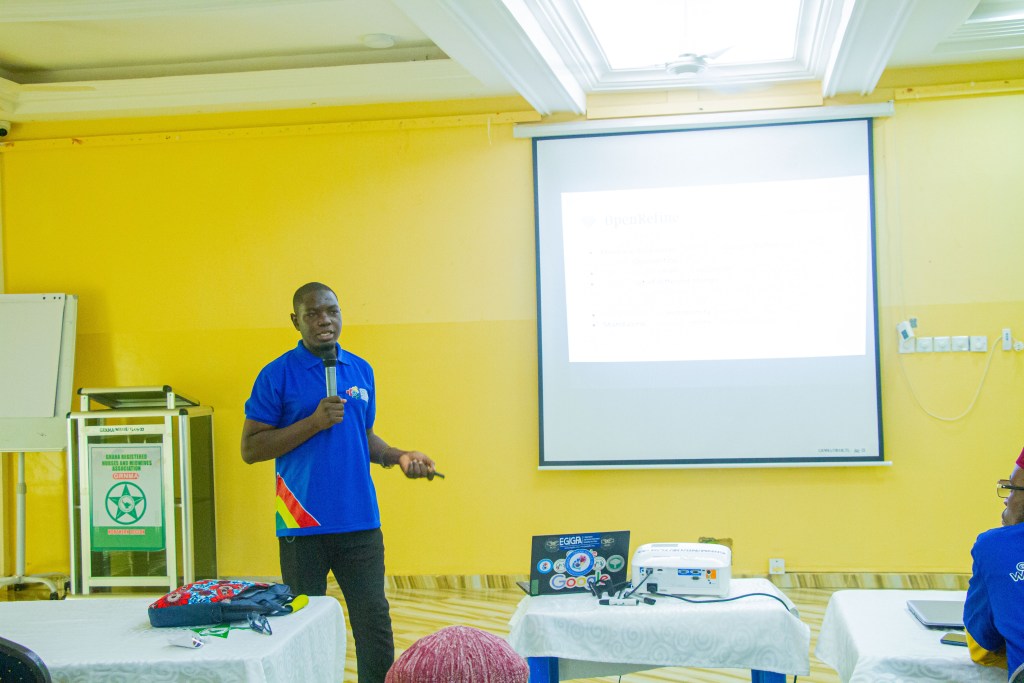
MR.KAMAL-DEEN (USER:Dnshitobu)What is OpenRefine?
- History and Evolution: Originally known as Freebase Gridworks in 2010, it rebranded as Google Refine before becoming OpenRefine in 2012.
- Purpose: OpenRefine is a versatile tool designed to clean and reconcile messy data. It allows users to perform a variety of data transformation tasks, making it a valuable asset for managing and refining large datasets.
Why Use OpenRefine for Wikimedia Projects?
1. Powerful Data Management:
- Faceting: Allows users to filter and explore data subsets.
- Transformations / GREL (General Refine Expression Language):** Facilitates complex data transformations and manipulations.
- Reconciliation: Matches and aligns data with external services, such as Wikidata, to ensure accuracy and consistency.
- Finding Gaps: Helps identify missing or incomplete information in datasets.
- Mass Upload & Editing: Efficiently handles large-scale data operations, including batch edits and uploads.
2. Community and Support:
- Active Community: OpenRefine has a supportive and engaged user community, which is beneficial for troubleshooting and learning.
- Standalone and Online Options: Available as a standalone product or through online platforms like PAWS (Python and Wiki for Scholars), making it accessible for various user preferences.
Getting Started with OpenRefine
Preparation
- Time Investment: Allocate some time to familiarize yourself with the tool and its features.
- Datasets or Images: Have datasets or images ready for practice and experimentation.
- Installation: Download and install the software from OpenRefine Releases. The installation process can be a bit tricky, so follow the provided instructions carefully.
- Wikimedia Commons Extension: Install the Wikimedia Commons extension from CommonsExtension GitHub to enhance functionality.
Understanding Context
- Structured Data for Commons: Gain an understanding of how structured data is used in Wikimedia Commons.
- Wikidata Knowledge: Familiarize yourself with Wikidata, especially data modeling principles.
Best Practices for Batch Edits
- Accuracy: Ensure the accuracy of your data to avoid introducing errors.
- Notability Criteria: Verify that your dataset meets the Notability criteria for Wikidata.
- Living People Policy: Adhere to the Living People Policy if your data includes information about living individuals.
- References and Sources: Add references to statements according to Wikidata’s sources guideline.
- Avoid Duplicates: Prevent the creation of duplicate items and follow suggested data modeling guidelines.
- Testing: Test bulk edits with a single item first to ensure accuracy.
- Communication: Keep an eye on your talk page for feedback and discussions related to your edits.
Ghanaian Pidgin Wikimedia Community In Perspective
The Ghanaian Pidgin Wikimedians Community is dedicated to developing, promoting, and improving the Ghanaian Pidgin Wikipedia and related Wikimedia projects. Our mission is to foster the use of Ghanaian Pidgin in Wikimedia projects through various outreach efforts and to support Ghanaians in contributing to knowledge in their native Pidgin language.
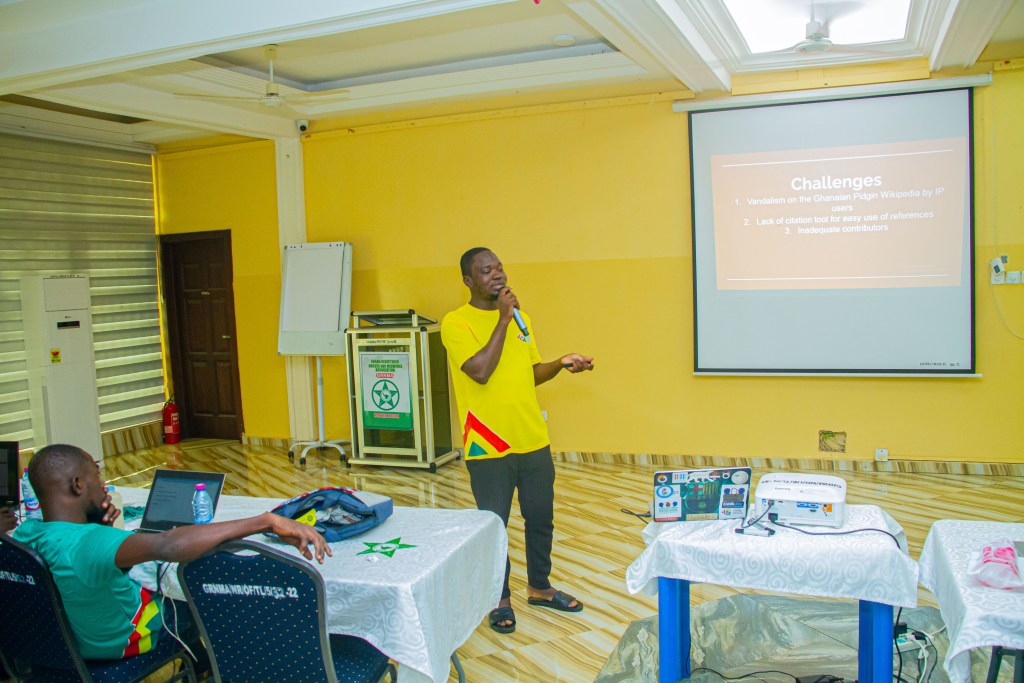
MR.FAISAL SPEAKING FOR GHANAIAN PIDGIN Our Projects
In August 2023, we partnered with the Open Foundation West Africa (OFWA) to teach students at Accra College of Education about contributing to Wikimedia projects in Ghanaian Pidgin. This initiative aimed to empower the next generation of educators to promote and preserve the Ghanaian Pidgin language.
In December 2023, we collaborated with the Intangible Cultural Heritage group to host an editathon focused on documenting and preserving intangible cultural heritage in Ghanaian Pidgin. This event brought together community members to create and improve articles related to Ghana’s rich cultural heritage.
Between May and June 2024, we organized the Africa Wiki Challenge in Ghanaian Pidgin. This challenge encouraged participants to create and translate content on African topics, promoting the use of Ghanaian Pidgin on Wikipedia and increasing the availability of information in the language.
In June 2024, we collaborated with Wiki Updates to organize the TGMA Awards Night. This event celebrated the contributions of Wikimedians and highlighted the importance of documenting and promoting the Ghanaian Pidgin language.
In August 2024, we partnered with Wiki Green Initiatives to promote environmental awareness and sustainability through Wikimedia projects. This collaboration aimed to create content in Ghanaian Pidgin that educates the public about environmental issues and encourages sustainable practices.
Currently, we are hosting an online editathon for Wiki Loves Sports 2024. This event focuses on documenting sports-related content in Ghanaian Pidgin, aiming to enrich the coverage of sports topics in the language and encourage community participation.
Challenges
The Ghanaian Pidgin Wikipedia has faced issues with vandalism from IP users, which disrupts the integrity of the content and poses a challenge to maintaining quality.
There is an inadequate citation tool for easy reference usage, making it difficult for contributors to properly cite sources and ensure the reliability of information.
The community struggles with a lack of sufficient contributors, limiting the scope and speed of content creation and improvement.
Future Goals
We aim to create a more sustainable community by implementing strategies to retain and recruit contributors, ensuring the long-term growth and success of the Ghanaian Pidgin Wikimedia projects.
We plan to work with other language communities to develop joint projects, fostering cross-cultural exchange and expanding the reach of Ghanaian Pidgin content.
A key focus will be on integrating Ghanaian Pidgin into AI technologies. This includes developing language models and tools that support the use of Ghanaian Pidgin in digital applications and promoting its usage and preservation in the digital age.
Fante Wikimedia Community In Perspective
The Fante Wikimedians Community is dedicated to promoting knowledge sharing and cultural preservation through collaborative efforts. Our community’s initiatives aim to enhance accessibility and engagement in the Fante language and culture, ensuring the sustainability of the Fante language in the digital age.

MR. ROBERT JAMAL SPEAKING FOR FANTE WIKIOur Objectives
Ensuring the Fante language is well-represented and preserved in the digital realm, encouraging the creation of high-quality content in Fante on Wikipedia and related platforms, and equipping Fante speakers with the skills needed to contribute effectively to Wikimedia projects.
To achieve these goals, we organize regular workshops and training sessions. These sessions equip community members with essential skills in editing and contributing to Wikipedia. By emphasizing the importance of quality content, we provide hands-on experience in using digital tools effectively.
We have launched various content creation campaigns aimed at increasing the representation of Fante culture on Wikipedia. These campaigns focus on writing articles about notable figures, historical events, and cultural practices, enriching the knowledge base with valuable Fante content.
Empowering women to lead Wikimedia workshops is crucial for fostering diversity and inclusion within the Wikimedia movement. When women take on leadership roles in these workshops, they bring unique perspectives and expertise that enhance the learning experience for all participants.
Our community has actively participated in visual content initiatives, capturing the essence of Fante culture through photographs and media. Some highlights include:
Collaborations
We have established partnerships with various organizations to enhance our initiatives. By collaborating with cultural institutions and Wikimedia movement projects such as Wiki World Heritage, Feminism and Folklore, and Arts + Feminism, we garner resources and expertise, amplifying the impact of our projects.
By integrating Wikipedia editing into the curriculum, students learn valuable skills while contributing to their community’s cultural heritage. Improving digital literacy among students is a key focus, ensuring they can effectively contribute to and benefit from Wikimedia projects.
Achievements
- There has been significant growth in the number of articles created and edited in Fante.
- Increase in active editors and community members.
- Contributions to knowledge equity and language preservation.
- Creation of academic content in Fante.
Challenges
Despite our successes, we face several challenges, including limited resources, language barriers, editor retention, and varying levels of digital literacy among members. Addressing these issues is crucial for the sustainability and growth of our community’s initiatives.
Future Plans
Looking ahead, we plan to expand our initiatives by:
Introducing more advanced training in different Wikimedia projects, enhancing collaboration with other language communities, and increasing outreach efforts to ensure a broader impact on Fante language preservation.
Twi Wikimedia Community In Perspective
Wikimedians of Twi Language, a dedicated non-profit organization focused on enhancing the digital presence of Twi and other Akan languages. Our mission is to amplify the visibility of these languages and preserve their rich cultural heritage through collaboration with the Wikimedia Foundation and active volunteering.
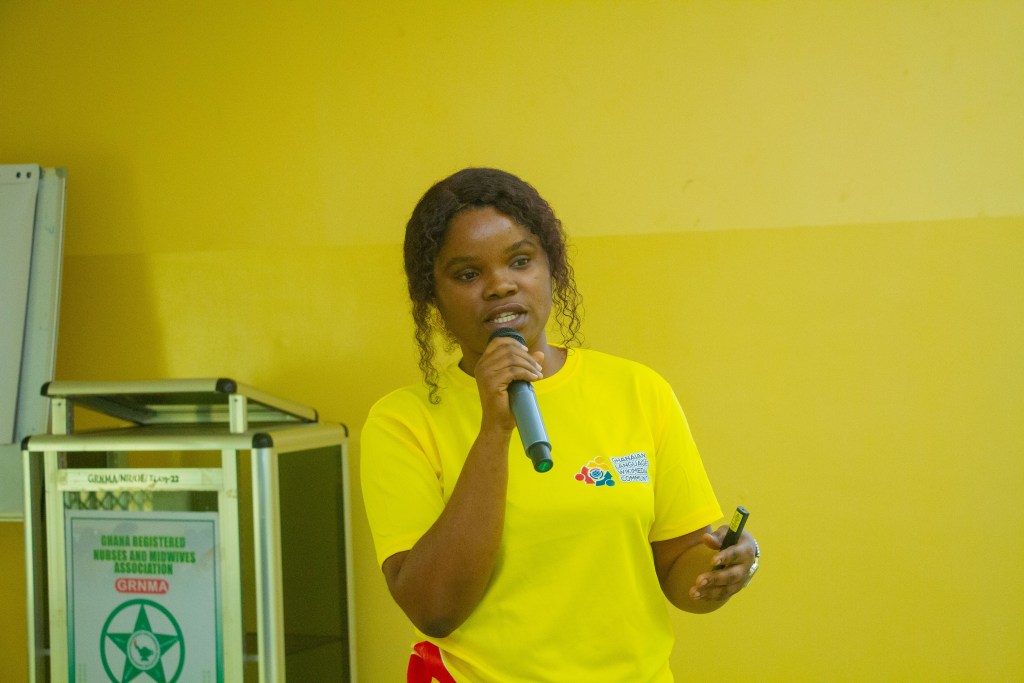
MS JEMIMA ANTWI SPEAKING FOR TWI WIKIMission and Core Objectives
Our mission centers around elevating the Twi language and its cultural significance online, ensuring global reach and recognition. We aim to equip Ghanaian youth with practical skills and opportunities, empowering them to contribute meaningfully to Wikimedia projects. Our core objectives include advancing Twi and Akan language projects, promoting Akan culture, and ensuring the preservation and relevance of the Twi language in the digital age.
Highlights of 2023
AfroCuration Ghana 2023: A major achievement, this event had the theme “WHO WE ARE!” and the sub-theme “REDEFINING AFRICA FROM THE PERSPECTIVE OF AFRICAN AUTHORS AND MUSICIANS.” It featured collaborations with prominent institutions such as the University of Education, Winneba, Kwame Nkrumah University of Science and Technology, and media partners including Oroko Radio and Joy News. Key collaborations also included the Dagbani, Moore, Ewe, and Gurene Wikimedians, and a partnership with the Moleskine Foundation.
Current Projects
- Wikidata for Education (2024): Enhancing educational resources on Wikidata to support learning.
- Health Projects:
- Medicinal Plants: Translate-a-thons I & II.
- Diseases: Translate-a-thon III.
- Twi/Igbo Wikidata Contest: Translating Supreme Court cases from Ghana and Nigeria.
- Kente Weaving: Collaborating with Bonwire Kente Weavers and Tafi Abuife Kente Village to document and promote Kente weaving traditions.
Challenges
Our community faces several challenges, including a lack of essential equipment like projectors and routers, limited access to laptops among members, and high internet data costs in Ghana, which hinder online efficiency.
Future Goals
We aim to increase the visibility and representation of Twi and Akan languages, forge partnerships with language organizations to enhance projects, encourage local language use in digital spaces, and support young Africans in sharing their stories.
Dagaare Wikimedia Community In Perspective
The Dagaare Wikimedia Community has embarked on an inspiring journey of preserving and promoting the Dagaare language through Wikimedia projects. From the initial steps to recent milestones, our community’s dedication and collaborative spirit have propelled us forward, showcasing remarkable achievements and paving the way for a bright future.
In January 2023, the Dagaare Wikimedia Community took a significant step forward by launching its incubator. By November of the same year, our long-awaited Dagaare Wikipedia went live at dga.wikipedia.org .This milestone was the result of the tireless efforts of former co-lead Alhassan Mohammed Awal, the passionate support from our team, and the invaluable collaboration with the Dagbani Wikimedians User Group. This success story underscores the power of unity and cross-community collaboration in achieving our goals.

MR ZAKARIA TUNSUNG SPEAKING FOR DAGAARE WIKIContent Creation Through Contests
From April 20 to June 20, 2023, we organized the 8th Parliament of Ghana contest in partnership with the Dagbani Wikimedia User Group. This initiative aimed to create articles for all 275 parliamentarians of Ghana’s 8th Parliament in the Dagaare language, reflecting the linguistic richness of the Upper West Region.
Building on the success of the previous contest, we launched the 7th Parliament of Ghana contest from October 10 to November 10, 2023. This effort further expanded Dagaare language content on Wikimedia platforms, contributing to the growing repository of information available in Dagaare.
Our commitment to local representation continued with Ghana’s Constituency Profile contest. This contest resulted in the creation of 100 Dagaare-language articles covering various constituencies across the country, enhancing local and national visibility.
We participated in the Wiki World Heritage Intangible Contest to encourage the creation and improvement of articles related to intangible cultural heritage. This initiative aimed to enrich Wikipedia with valuable content about Dagaare cultural practices.
Fostering Community Through In-Person Meetings
The community organized three significant in-person meetings in Wa, the capital of the Upper West Region. These gatherings were crucial for fostering community growth, welcoming new contributors, and strengthening relationships among members.
An additional meeting at the Ajumako campus expanded our reach, engaging both seasoned contributors and enthusiastic newcomers. These physical meetings played a key role in enhancing collaboration, sharing knowledge, and achieving our collective goals.
Achievements
On December 23, 2023, the Dagaare Wikimedia Community participated in an end-of-year get-together and awards ceremony hosted by the Dagbani Wikimedians User Group. This event celebrated the dedication of our top contributors, recognizing their invaluable contributions to the Dagaare Wikipedia project and highlighting their commitment to preserving our linguistic heritage.
Funding and Financial Support
The financial backing from the Dagbani Wikimedians User Group has been pivotal in our journey. Funds have been used for workshops, team remuneration, t-shirt printing, community projects, and awards for top contributors. This support has been instrumental in our achievements and continued progress.
Challenges and Future Directions
- Financial Constraints: Our activities often exceed the allocated funds.
- Team Support:There is a need for more support and active contributors within the large membership.
- Resource Limitations: Limited resources and financial constraints pose ongoing challenges.
The Way Forward
To address these challenges, we plan to:
- Sanitize Existing Articles: Improve the quality of current content.
- Enhance Wikidata Items:Add and refine Wikidata entries.
- Improve Linking and Referencing: Strengthen article interlinking and citations.
- Capacity Building: Provide training for both team members and the wider community.
- Outreach Programs: Introduce radio programs and other initiatives to engage a broader Dagaare-speaking audience.
Individual Grants
The introduction of individual grants will offer vital support, enabling the Dagaare Wikimedia Community to advance our initiatives and enhance our language’s representation on Wikimedia platforms.
Moore Wikimedia Community In Perspective
The Moore Wikimedia Community has embarked on a transformative journey to enhance its impact and effectiveness. As part of our ongoing efforts to bolster community engagement and participation, we are focusing on restructuring our organizational and operational strategies. Here’s a comprehensive look at our current initiatives and future goals.
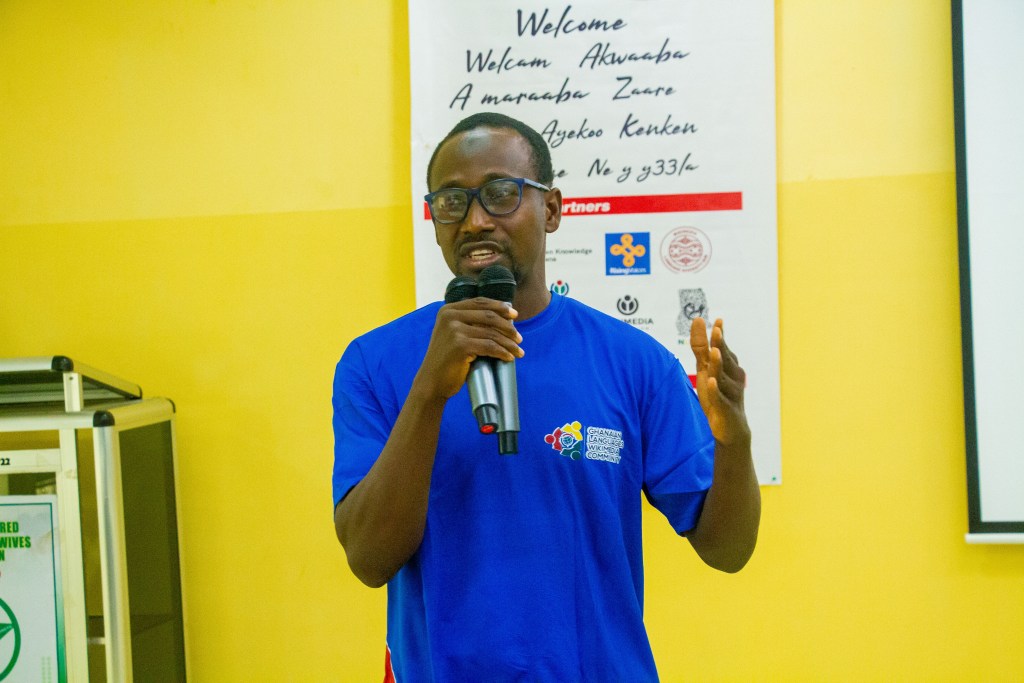
MR. ALIDU ALHASSAN SPEAKING FOR MOORE WIKIOrganizational Restructuring
To streamline our operations and improve efficiency, we have undertaken a significant organizational restructuring. This involves reassigning roles within the community to better align with individual strengths and interests. By doing so, we aim to optimize our team’s capabilities and enhance overall productivity.
We have also adopted an outsourcing strategy to address specific needs and projects. This approach will allow us to leverage external expertise and resources, ensuring that we can effectively tackle complex challenges and achieve our objectives.
Improving Community Participation
One of our primary goals is to improve the community’s understanding of Wikimedia and how they can contribute their skills to our projects. We are dedicated to providing clear guidance and support, helping members grasp the significance of their contributions and how they fit into the larger Wikimedia ecosystem.
We are committed to empowering our community members with the skills needed to contribute effectively. By offering training and resources, we aim to reduce reliance on others and encourage self-sufficiency. This empowerment will enhance individual contributions and foster a more dynamic and engaged community.
The diversity of interests within our community is a strength, but it also presents challenges. We are working to manage this heterogeneity by ensuring that all members’ interests are acknowledged and integrated into our activities. This approach will help maintain unity and purpose while respecting individual passions.
Building a strong community identity is crucial for fostering a sense of belonging and passion. We are focusing on activities and initiatives that will strengthen our community’s identity and enhance engagement. By igniting passion and promoting unity, we aim to create a more cohesive and motivated group.
Diversification of Communication Channels
To improve engagement and reach, we are diversifying our communication channels. This multi-faceted approach will help us connect with a broader audience and enhance our visibility. Our channels include:
- Social Media: Leveraging platforms to share updates, engage with members, and promote our initiatives.
- Face-to-Face Interactions: Organizing in-person meetings and workshops to foster personal connections and collaboration.
- Events: Hosting events to bring the community together and celebrate our achievements.
- Traditional Media: Utilizing traditional media outlets to reach a wider audience and increase awareness of our projects.
Kusaal Wikimedia Community In Perspective
The Kusaal Wikimedia Community (KWC) was established in March 2022, initially operating through a Facebook group. This digital platform served as a foundation for building a network of Kusaal language enthusiasts and contributors.
In November 2022, KWC took a significant step forward by joining the Dagbani Wikimedians User Group. This transition was facilitated by Musah Fuseini, whose dedication and reliability were instrumental in integrating KWC into the broader Wikimedia ecosystem.
With the efforts of Mr. Michael, we successfully recruited volunteers, many of whom were teachers from underserved areas. These volunteers have been crucial in advancing our mission and expanding our reach.

MR. AWINIMI FROM KUSAAL WIKIAchievements
Our community has grown to include 104 volunteers, with 20 editors and 10 active editors.
KWC has published 989 articles on Wikipedia, with more content continually being added. We participated in the 7th and 8th Parliamentary Contests, showcasing our commitment to knowledge sharing and cultural documentation. We held a capacity-building workshop at the Ajumako Campus, which was pivotal in enhancing our community’s skills and cohesion. Our focus on transparency and unity has strengthened our internal operations and community relationships.
Challenges
Our visibility online is still developing, and we are working to enhance our digital footprint. Many of our members face challenges with digital literacy, which affects their ability to contribute effectively, Documenting the Kusaal language remains a priority, but we encounter obstacles in terms of resources and expertise. Engaging the community consistently and effectively is an ongoing challenge and Insufficient equipment hampers our ability to conduct training and contribute to Wikimedia projects.
Way Forward and Plans
To address these challenges and further our mission, we have outlined several key initiatives:
Training Programs
Target Audience: 50% women, 20% students, 60% teachers, 30% others
Objectives
Train school representatives and colleagues to enhance their contributions.
Encourage each teacher to publish at least two articles per week.
Conduct quarterly physical visits to provide support and gather feedback.
Community Engagement
Biographies: Document notable individuals and local figures.
Schools: Collaborate with schools for educational projects and article contributions.
Monuments and Local Landmarks: Focus on documenting significant structures and landmarks.
Events: Capture and share cultural movements, traditional practices, and folklore.
Emerging Trends
Diseases: Document and raise awareness about health-related issues.
Innovations: Highlight technological and innovative advancements.
Renewable Energy: Explore and document renewable energy initiatives.
Sustainable Agriculture: Promote and document practices in sustainable agriculture.
Climate Change: Address and document climate change impacts and solutions.
Ga Wikimedia Community In Perspective
The Ga language, spoken by 3.6% of Ghana’s population, holds a significant place in the country’s linguistic landscape. It ranks as the 10th most spoken language and is the 6th among government-sponsored local languages. As the language of Ghana’s capital city, Ga is pivotal to the nation’s cultural heritage. Despite its importance, Ga faces challenges in documentation and preservation, with written content coverage currently below 1.3%.
Much of Ga history is traditionally passed down orally. To safeguard this rich heritage, it is crucial to leverage open knowledge platforms like Wikipedia. The Ga Wikimedia Community is dedicated to addressing this gap by using Wikimedia projects to document and preserve the Ga language and culture.
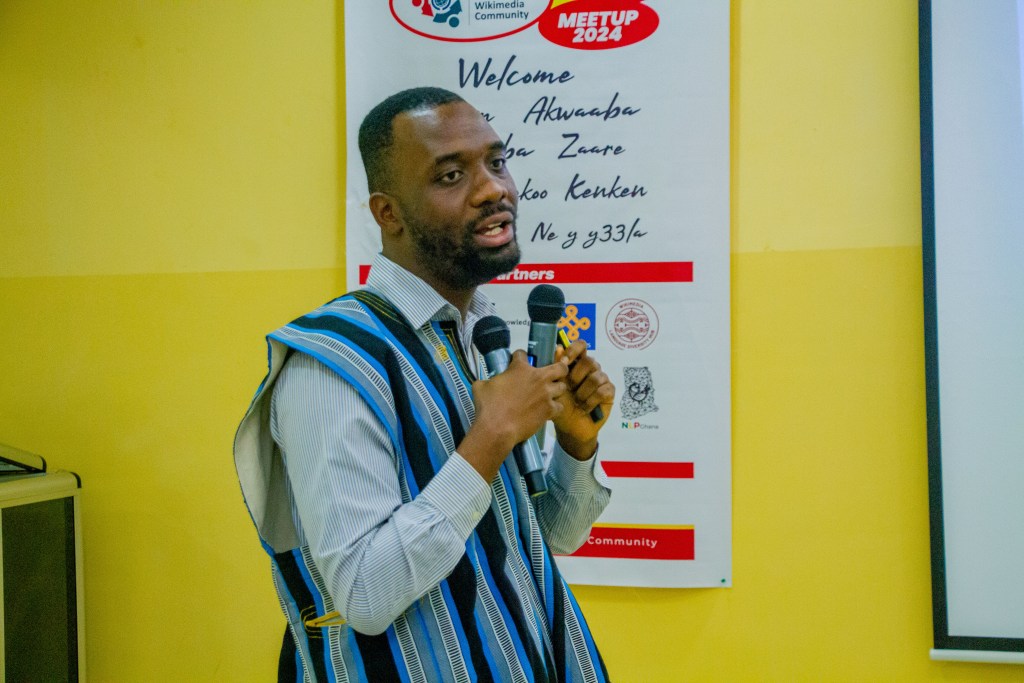
MR JAMES AMATTEY SPEAKING FOR GA WIKIAbout the Ga Wikimedia Community
We are a community of dedicated volunteers committed to enhancing the presence of the Ga language on Wikipedia. Our mission is to ensure the survival and growth of the Ga language through active contributions and community involvement.
The Ga Wikipedia Project was founded in April 2008. Despite being 16 years old, contributions have been sparse, and progress has been slow. We are currently in the incubator phase and are working towards moving the project out of this status to become a full-fledged Wikipedia edition.
Immediate Goals
Our primary goal is to find a core group of Ga writers who are committed to translating content and increasing the volume of written material. We aim to transition from the incubator to a mainstream Wikipedia project within the shortest possible time.
Current Status and Activities
41 active editors, 86 articles in the incubator, 585 edits, and 130 pages.
We recently organized an edit-a-thon to boost the number of articles in Wikidata for Education. This event, held twice at the Impact Hub in Accra, was part of our strategy to increase engagement and content.
Future Plans and Expansion
Given the high representation of Ga alphabets and characters in mobile keyboards, we plan to build capacity on how to use mobile phones effectively for editing Wikipedia.
Activities and Events
Software Freedom Day: We organized a presentation and an edit-a-thon with students to promote Ga language content and engage the community.
Collaborations
We are open to collaborations with other projects to increase the number of qualified Ga speakers and writers. Partnering with individuals and organizations will be crucial for expanding our reach and impact.
Challenges
There is a shortage of desktop keyboards and other technology for Ga language input, and despite having speakers, there is a notable lack of writers who can contribute to the project. Limited financial resources constrain our ability to execute projects effectively, and we face difficulties in retaining the few members we have and sustaining their involvement.
Wiki Loves Living Heritage And Wikisource
During the presentation, Joris Darlington explored two vital Wikimedia initiatives: Wiki Loves Living Heritage and Wikisource. These projects play a crucial role in preserving cultural and linguistic heritage, particularly in regions facing significant challenges. The presentation provided a comprehensive overview of their impact and goals, emphasizing their importance in documenting and celebrating intangible cultural heritage.
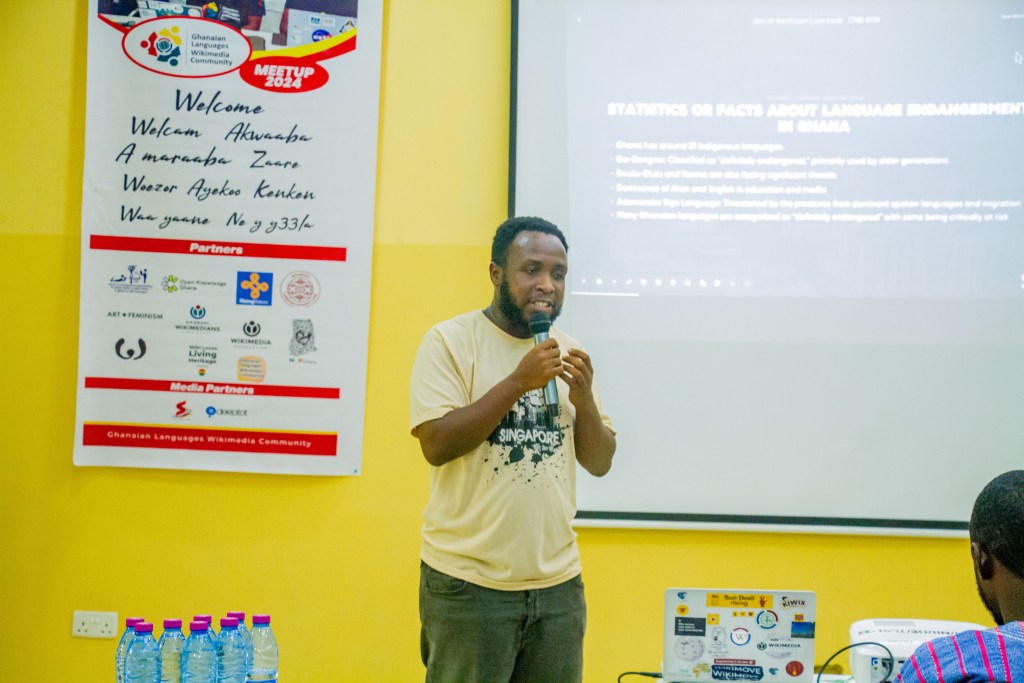
MR JORIS DARLINGTON In Ghana, the preservation of indigenous languages is increasingly urgent. With approximately 81 native languages, many are endangered or critically at risk due to the dominance of Akan and English in education and media. Languages such as Ga-Dangme, Ewutu-Efutu, Nzema, and Adamorobe Sign Language face severe threats. Preserving these languages is essential for maintaining cultural identity, promoting linguistic diversity, and supporting local communities.
The Wiki Loves Living Heritage campaign aims to document and celebrate intangible cultural heritage worldwide. It engages communities, Wikimedia volunteers, and heritage practitioners to share traditions like oral histories and rituals. This initiative promotes the awareness and preservation of cultural practices through ethical sharing and open access, ensuring that valuable cultural traditions are not lost to time.
Wikisource serves as a valuable resource for historical preservation by providing free access to public domain texts and historical documents. It supports texts in multiple languages, fostering global collaboration and educational use. By digitizing and making historical texts available, Wikisource contributes to the preservation of cultural heritage and provides a crucial educational resource.
In documenting intangible heritage, digital tools and global collaboration offer significant opportunities. Engaging communities in the documentation process and raising public awareness are essential for preserving and celebrating cultural practices. High-quality documentation requires attention to detail in photography and a clear understanding of metadata and licensing to ensure proper attribution and protection. Through these efforts, initiatives like Wiki Loves Living Heritage and Wikisource play a vital role in safeguarding cultural diversity for future generations.
Nzema Wikimedia Community In Perspective
The Nzema Wikimedia Community, where a passionate group of individuals is dedicated to bringing the Nzema dialect and cultural heritage to the global digital stage, has a mission that is: to preserve, protect, and celebrate the rich cultural diversity of the Nzema people through the power of open knowledge and digital collaboration.
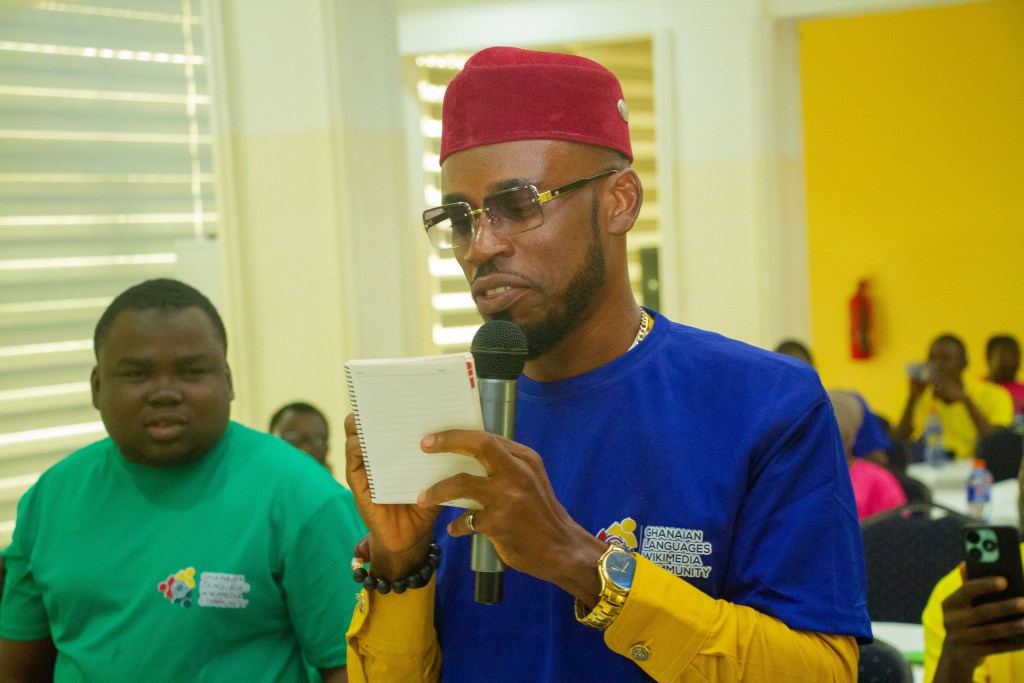
MR VALENTINE BADU SPEAKING FOR NZEMA WIKIOur Vision
Our vision is ambitious yet grounded in the deep-rooted traditions of the Nzema people. We aim to present the cultural heritage of the Nzema dialect to a worldwide audience, ensuring that this vibrant culture is not only preserved but also accessible to future generations. By supporting the free, open knowledge policy of the Wikimedia movement, we collaborate with various communities and foundations to bring our projects and events to life.
Our Mission
We invite people to join the free use of open knowledge software, emphasizing the importance and advantages of volunteerism.
We advocate for the Wikimedia projects and the use of free licenses.
We train individuals on content creation and editing, organize projects and events, and collaborate with other language communities willing to work with us on Wikipedia and its sister projects.
Background
The idea of the Nzema Wikimedia Community took shape in 2023, inspired by a workshop organized by the Wikimedians of Twi language under the Global Open Initiative Foundation at the University of Education, Winneba (Ajumako Campus). After extensive consultations, our community was formally established. The Nzema dialect, spoken in Ghana’s Western Region and parts of Ivory Coast due to migration, now has a dedicated community working to ensure its digital preservation.
A language community is a collection of people who speak the same language, united by their interest in learning or improving their linguistic skills. The Nzema Dialect Community includes individuals who speak and write Nzema, focusing on enhancing their skills and promoting their cultural identity. For years, the Wikimedia movement has emphasized the importance of expanding language communities to protect and preserve cultural diversity, leading to the establishment of our community.
Steps and Learning
The Nzema Dialect Community has partnered with the University of Education, Winneba (Ajumako campus), and the Akan Nzema Department, signing an MOU to ensure sustainable and high-quality work. This collaboration involves lecturers, students, and the entire department, providing a strong foundation for our community’s growth and development.
Results and Timeline
Starting with the incubation process, we have moved to translatewiki and held our first in-person workshop on June 28, 2024, at the Ajumako campus. This workshop was a significant success, with 52 participants—marking a 300% growth from our initial 12 members—who now have the skills to edit independently. By December, we aim to transition from the incubator to live status, increasing our capacity, mentoring members, and developing leadership roles to establish a solid and well-organized community.
Challenges
Despite our progress, we face several challenges:
- Lack of Laptops: All 48 members currently rely on their phones for editing.
- Insufficient Logistics: We need projectors, routers, and other equipment for our workshops.
- High Data Costs and Unstable Networks: These issues hinder our editing efforts.
- We need support for transportation and per diem to encourage volunteer participation.
We seek assistance from other language communities, the Wikimedia Foundation, and individual Wikimedians to address these challenges and support our growth and sustainability.
Dagbani Wikimedia Community In Perspective
Mr. Sadik Shahadu, the Executive Director of the Dagbani Wikimedians User Group, offered an enlightening overview of their significant initiatives and collaborative efforts. The presentation showcased their commitment to advancing the Dagbani language on Wikimedia platforms and fostering robust community engagement. Here’s a closer look at their notable projects:
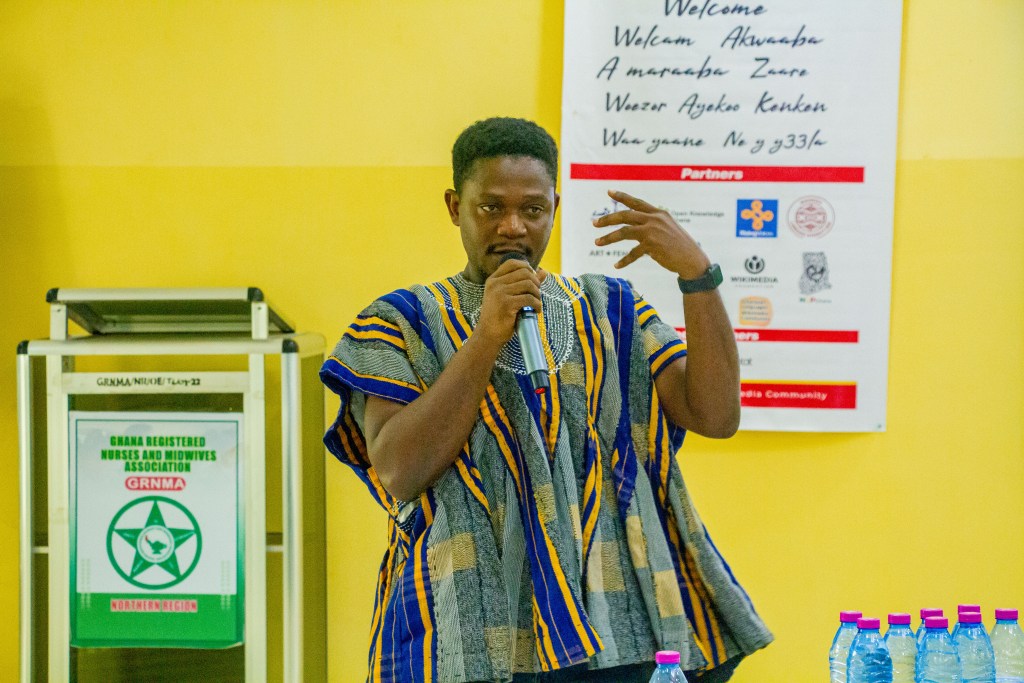
MR. SADIK SPEAKING FOR DAGBANI WIKICollaboration with Moleskine Foundation
A key highlight of the Dagbani Wikimedians’ recent activities is their collaboration with the Moleskine Foundation. This partnership was centered around translating articles under the theme “Redefining Africa from the Perspective of African Authors and Musicians.” This initiative seeked to amplify African perspectives by translating important works into Dagbani. The goal was to enhance the representation of African viewpoints on Wikimedia platforms.
By broadening the range of content available in Dagbani, this collaboration not only enriches the cultural discourse but also supports the preservation and dissemination of African knowledge through digital platforms.
Dagbani Wikipedia Saha
Another major project highlighted by Mr. Sadik was the Dagbani Wikipedia Saha program. This tele-education initiative aims to train individuals who are interested in contributing to the Dagbani Wikipedia.
The program is designed to equip community members with the skills and knowledge needed to create and enhance content on Dagbani Wikipedia effectively. By providing targeted training, Dagbani Wikipedia Saha aims to build a vibrant community of contributors who can continually develop and expand Dagbani content online.
This initiative fosters a culture of learning and active participation, ensuring that more individuals are prepared to contribute to and improve the Dagbani knowledge base on Wikipedia.
Translating MediaWiki Statements
The Dagbani Wikimedians also embarked on a project to translate commonly used MediaWiki statements on TranslateWiki. This effort was focused on making the MediaWiki interface more accessible to Dagbani speakers and readers, thereby improving their experience and participation on Wikimedia platforms.
The translation of MediaWiki statements aimed to facilitate easier navigation and interaction with Wikimedia tools for Dagbani speakers and readers. This project enhances the accessibility of Wikimedia resources for Dagbani users, promoting greater engagement and contributing to a more inclusive digital environment.
Parliament of Ghana Contest Series: 7th and 8th Parliament of Ghana
In addition to these initiatives, the Dagbani Wikimedians organized contests to create content related to the Ghanaian Parliament.
The goal was to develop articles on the 7th and 8th Parliaments of Ghana, focusing on the achievements and activities of parliamentarians in the Dagbani language.
These contests have resulted in the creation of valuable content that enhances the representation of Ghanaian political history and current affairs in Dagbani, contributing to the preservation of local political knowledge.
Conclusion
At the end of the meetup, participants enjoyed a sightseeing trip to the Savannah Centre for Contemporary Art (SCCA) and the Red Clay Studio. At the Red Clay Studio, they explored a unique collection of archival items, including old aeroplanes, shoemaker boxes, lanterns, traditional pots, old railway line metals, and photographs by James Barnor.
Reflections from all Community Members
It will be very good if they extend the days to one week and also be on holidays so that we can get full participation and also add others, like games.
I really appreciate the efforts of the leaders and the organizers of this year’s meetup. They made it memorable and very educational. I pray and hope to be part of next year’s event.
It was so educational and entertaining. I was very grateful to be part of this project.
I will like to use this opportunity to thank all the organisers who made this meetup possible.
This meetup is educational and full of fun.
A big thank you to the organizers and team for this great, fun event.
I really enjoyed this year’s meetup, and I will like to be part of it next year. May God bless all the organizers
If possible, another region can be considered next time, please.
Collaborate and build on the availability of funds and gadgets.
Team could arrange for accommodation based on final registration. Also, talk to some media stations ahead.
Sightseeing could be first on the list when we land after resting on day 1
I think we should add any kind of entertainment, like cultural performances, from any of the language groups, not necessarily from the north.
I actually didn’t come across any shortcomings throughout the event, but what I can say is that the organizers did a great job with their plans for this meetup. I would plead with them to keep it up.
I suggest that next time you bring in more workshops or training sections so that participants can learn and go and teach their community members at their various community gatherings.
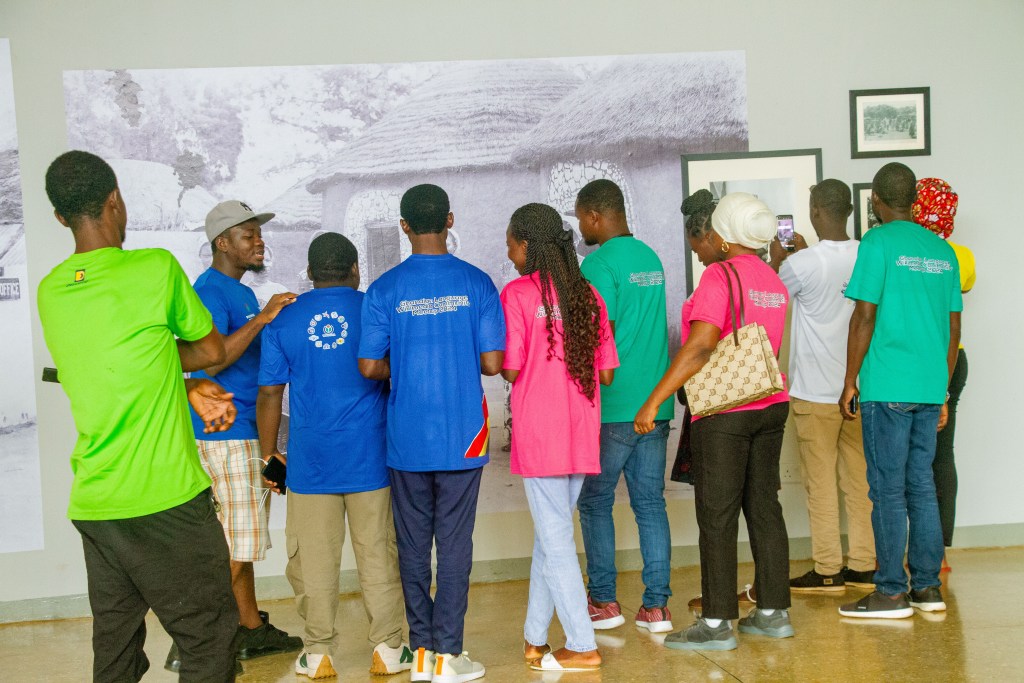

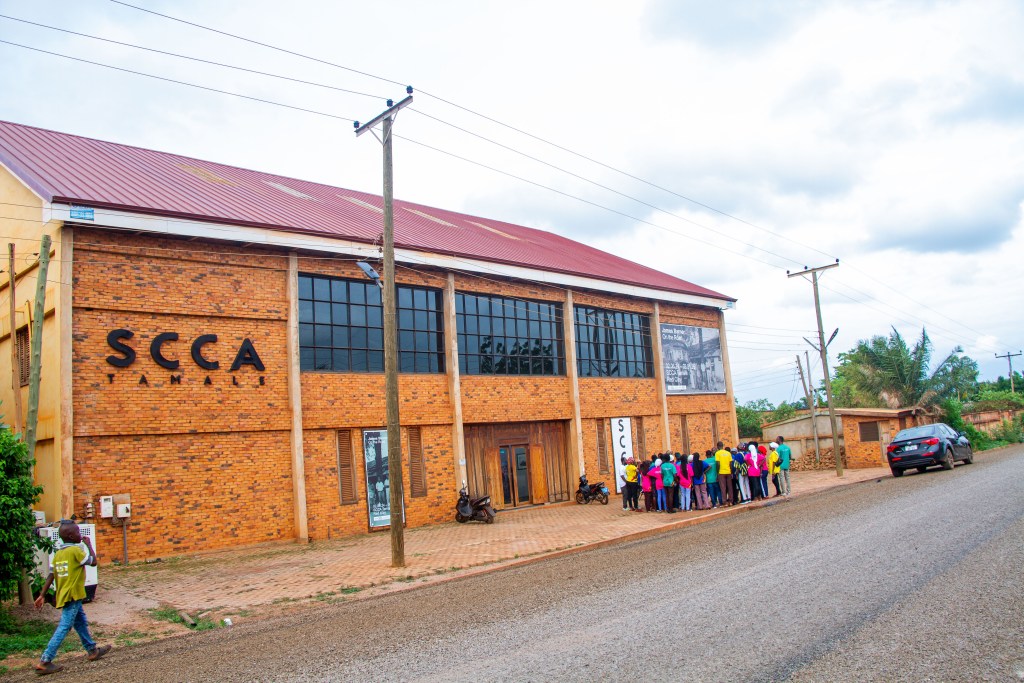
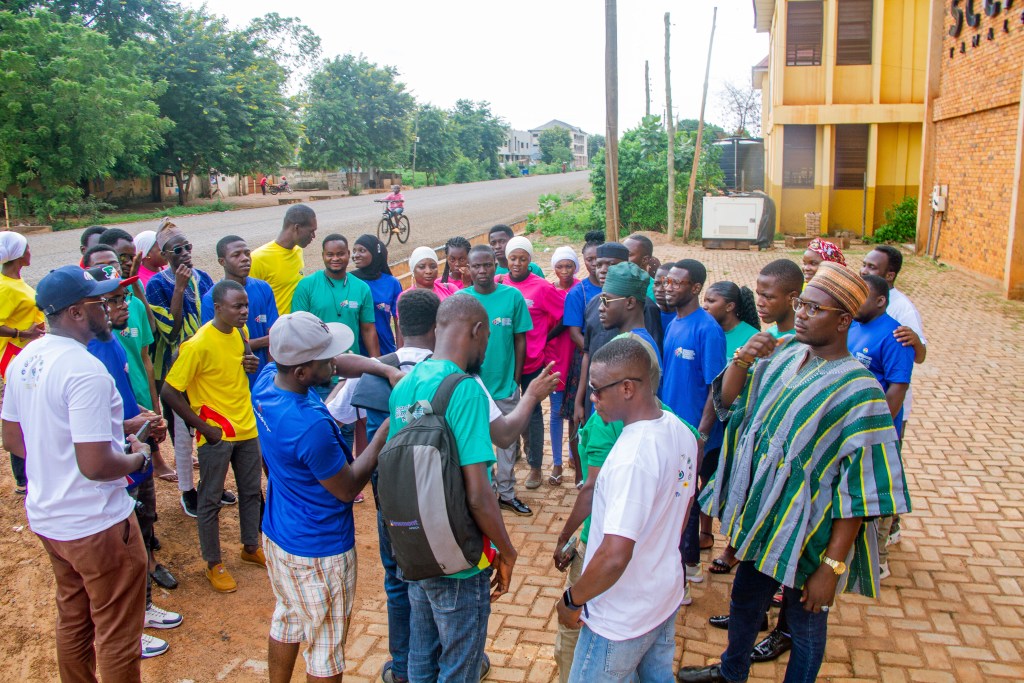

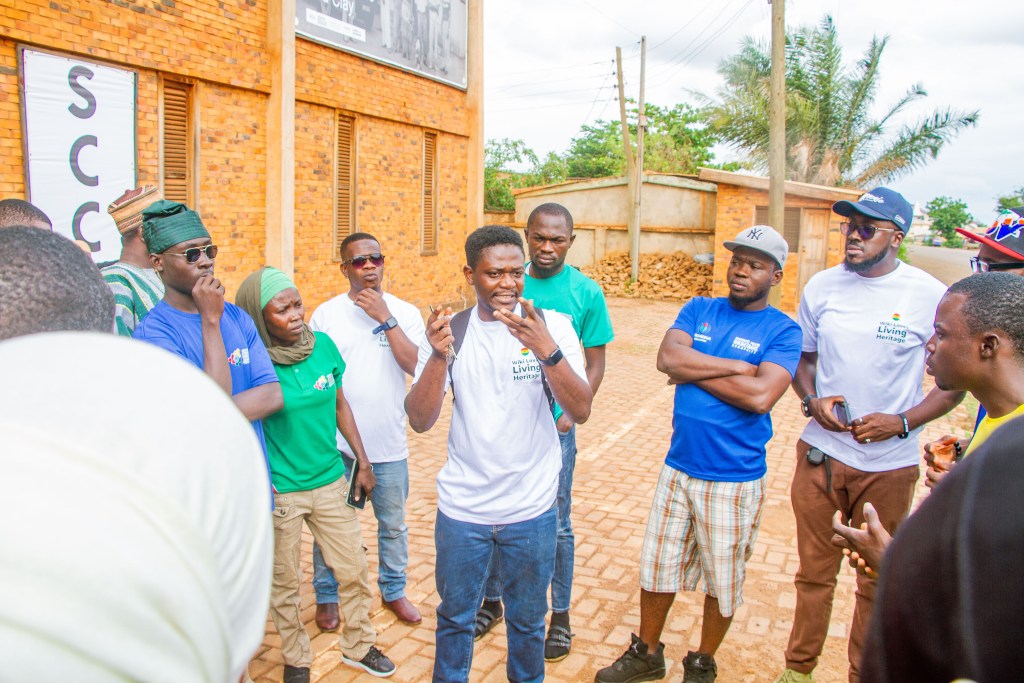
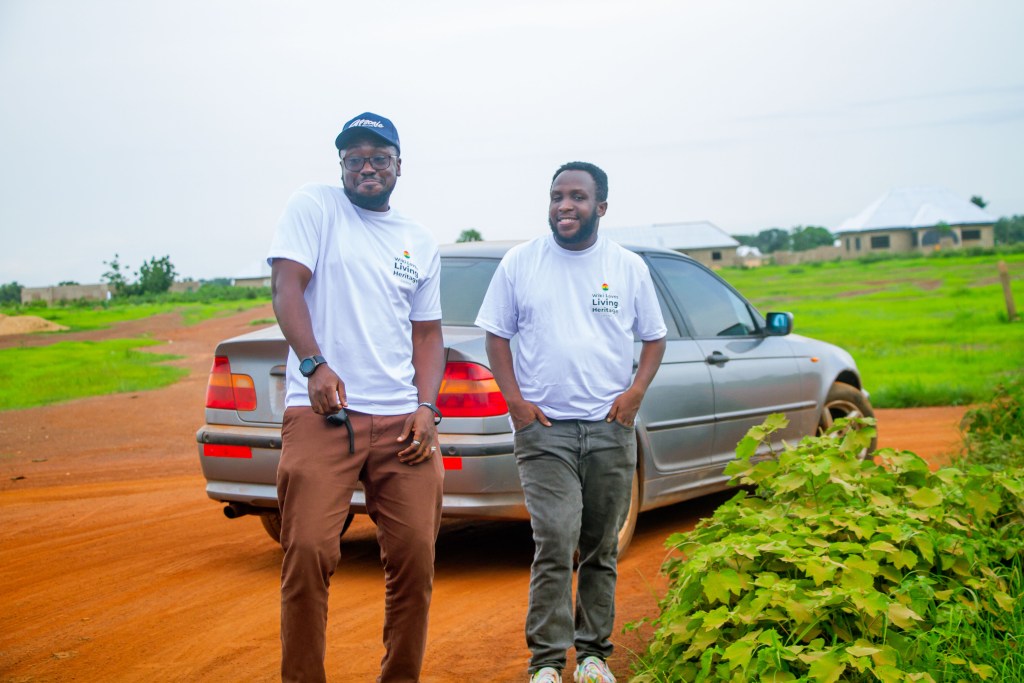

Can you help us translate this article?
In order for this article to reach as many people as possible we would like your help. Can you translate this article to get the message out?
Start translation